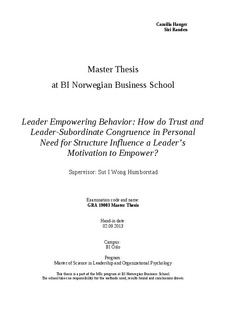| dc.description.abstract | An important part of understanding leader empowering behavior is to establish its
determinants. By understanding its determinants, leaders can become aware of
what may influence their behavior, both unconsciously and consciously. This
study therefore explores leader empowering behavior in relation to such assumed
determinants in order to test if they have an impact on exercising leader
empowering behavior. Our chosen determinants for this study are related to
empowerment in both new ways and in old ways. The new angle is to look into
similarity in personality characteristics, and more specifically personal need for
structure. The old angle is linking trust to empowerment, which have been done in
several previous studies. However, we have chosen to follow a more recent
approach and look at leader’s trust in subordinates as a determinant. We propose
that personality similarity in personal need for structure will lead to more trust in
subordinates, and that higher trust again will influence leader empowering
behavior. We justify this approach by previous researchers’ findings that
personality similarities lead to more trust, and from indications that trust between
leader and subordinate is likely to lead to leader empowering behavior. We further
intend to establish if there is a direct relationship between personality similarities
and leader empowering behavior, hence a direct relationship between similarity in
personal need for structure and leader empowering behavior.
Contrary to our expectations, and previous research supporting a positive
influence of similarity in individual differences, leader-subordinate congruence in
personal need for structure did not influence trust nor leader empowering
behavior. Rather, our findings reveal that subordinates’ levels of personal need for
structure appear to play an important role for leaders’ trust in subordinates,
however not in relation to the display of leader empowering behavior. An
elaborative discussion of our findings is shared along with possible limitations
and directions for further research. | no_NO |
